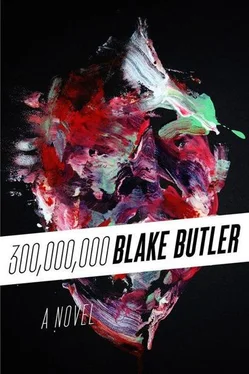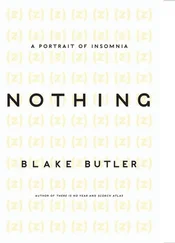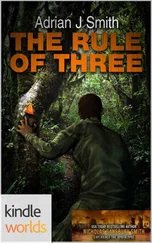In the sick sound of no sleeping Flood’s blood won’t shut the fuck up; he hears people moving around in the house above him; he hears throughout his brain the sound of the voice he hears radiating from Gravey’s body when he looks directly at him, a voice louder than the voice already sealed into him of the woman of his own life and the woman who had brought him out of her to stand beside her and who he had left each day and again.
The room beneath the house where He had hid the bodies is clean again, like new; clean as a room can be inside the knowing he knows of it in here already having seen what had been done; knowing, too, what could be done again inside it or had been done before the birthing of his eyes; what earth had been scooped out of the earth here to carve space for this room to exist so that the room could fill with blood.
No, the room is not clean. The walls are white; the smell of chlorine, acid, antiseptic, several smokes, the ash of ash: all clouds in something secondary of the mask he feels becoming affixed around his skull each minute he inhales it. He cannot leave. His face feels tight, a wire frame. The lights all in the house above the room are off; he can hear the floor and spaces just above him listen as he moves along the mirrored surface vibrating silent in his human loam.
Along the long wall in the room again there is a window built into the frame. The window looks out onto the dirt of the earth. The tail end of a fist-sized lash of granite butt-ends up eye first against the glass from the other side, reflecting the beam end of Flood’s lamp. The glass seems breathed on from the other side.
Flood’s feet on the flooring squeak like the NBA. In his mind he counts backward through the names of those he can remember from the speaking, assigning in the fleshless vortex where they might have lain among the mass. Each name, in his head, sounds like the same name, and so he does not let them out. He hears the in-tick of a furnace initiate itself to come alive and warm the rooms above.
[In the continuing scene, as the heat above him rises, though the room itself will not grow warm, a smell about the ceiling coming down around him stinks like someone waking up, putting on a skin-suit made of rubber, walking to a door inside the house, closing the door.]
Flood keeps thinking he hears someone other in him thinking. Someone predicting his own thoughts, his movements, what he is. What light is in the room seems electronic.
Flood sees someone standing just behind him, at the edges of his vision. His instinct to turn becomes instantaneously overwhelmed with something sharper: to hold on inside this feeling, to let the person there remain there, to listen to them think and breathe . This has, on Flood, the effect of making time seem several times longer, slowing down his aging, which as he notes this feeling, he will in his sleep remember how to learn, thus causing his time on earth to be distinctly extended hour by hour up until right now in this house.
As he’s holding in this moment, the tendons in his arms becoming hard, framing the shape of his skull with further skulls inside him, Flood observes the character observing him taking more form: he can see more about her (it is a her) face and arms and chest and legs and muscles, though he finds it hard to piece together more than one, or to hold the whole of what she is together more than any instant, seeing seconds turning solid into new memory, rubbing the older shafts in him awake.
The form is so near to heart, close enough to make him open to it further, though at the same time he wishes to resist. Each time he sees her he is seeing something new, and yet the newness has a gloss about it, a second cover: he can recognize the form, but cannot hold the form up to itself, and the smell of the room keeps washing in, and the fidget of his body tries to stay both soft and motionless, observing in fear that when he moves for sure the premonition will disappear; as, he remembers, there’s not actually someone there behind him, and never has been; this is an elaboration on an instinct, a way to live. In thinking this, close up, just as the image threatens slowly to see into him and see him seeing, the moment shifts and so is gone. The room is empty. There are no bodies.
Flood turns to look now at where he felt there’d been the other person and sees instead, like so: the wall.
Flood starts laughing. He’s not moving his mouth or face; he doesn’t want to laugh; the sound is not like him. The sound is coming out of holes in his skin (so many of them) or perhaps from his ears (ejecting what’s come in before but in reverse) or something else about his head he can’t synthesize with enough precision to speak about it. He feels the cords vibrate in his neck, his runny blood. The laughter fills the space and wiggles through it, cordless, multiplying in diffraction, then gone again, where its remainder is everything at once wanting to be said while he says nothing and he looks. Looks again for something someone might have missed about the space’s frame or where about it or some other motion not about the bodies, having since been photographed, described, inscribed, removed, examined, identified (if possible), interred (if possible), memorialized, indexed, held aloft in glimmered minds. So many hands have been here, finessing surfaces, expurgating, eyes shut or open at various points, attempting to collect from harbors of the false light something wrought about the intention or issuance of the Events (i.e. the Killings), though what is there to say. How many can we count, what method of dispatch, how many hours alive before not alive, what name, what age. These are questions that have been asked and will be asked again regardless of the answers being given regardless of the year. These are the small bulbs on a white tree rising above the country in slow season for the worship of the Day; and yet here inside the room is Flood.
Each place Flood allows Flood’s foot to touch the floor covered with its clean mirrors makes him grow older; both the house and he change every time, aging together, changing; in this way he is many of him in many houses; in this way he will never leave the house.
He cannot hear the onset of the camera burning film somewhere above him over the roar of what is not there, the song having set so hard upon the house that it is the house and it will be the end and beginning yet again.
Again, behind him, behind Flood’s body, there is the shift of presence, though this time as he feels it align he spins around. He feels the minutes peeling from his other life, turning, the cords in his arms burning, his fingers wrapped around a weapon he has not brought; the gun seated barrel-up toward the ceiling between twin pillows on his white bed for the purpose of watching anything but what will come into the room.
In this room where so many bodies died. Where so many had been, dying. Where so many were.
There: there he is there in the mirror there this time he sees him he can catch him he is not her but him; in the glass of it he’s not so old but younger now, he knows, if bloated, if glassed around the face with liquid staying in and wanting out, the meat around his eyes the color of the meat they’d pulled out of here by the poundload as he stood upstairs in a version of a room without locked doors and tried not to hear the words of anyone around him as he recorded another instance of the life inside his mind by walking slow from room to room in learning and wishing his fingers could spurt gold, wishing it were him they were pulling out of there then and with the skins turned inside out while his stays white and tired and retarded and having let any person down and surrounded by others who have so done the same; it doesn’t even matter anymore to feel that or think about it in the hour because that is part of the definition of the name; that is god, for him, that is god, for him, that is god as god will be, for him, and he is he. There, there he is watching him watch him remember who he was just those days, however many days, and younger now and dumber now, the age leaking out of him from the agelessness from which he had been born, no way to keep it in, no way to want it out, unlike the blood; the gift these dead had been given and not even there to celebrate it any longer, being the worst joke and saddest fuckfreak thinking of them all, and their houses and their money and their stocks and bonds and their children and their haircuts and who they’d had sex with and where they’d been and where they’d wanted to be or to visit and their fingers and their keys, their memories of whoever, each erasing over time as time goes on, and him there against it and inside it, and him here again in echo of that in the house this time alone, and him there on the wall there watching him watch him remember and him there again there on the ground, the instance of his head and torso spread beneath him in rescinding dimension in such a way that he appears as a different kind of ache, a 2-D aping of his 3-D dumb ass standing goremouthed in the image of the room of dead, alone in the Black House having laughed and never meant it, having never meant it, there he is. The he who in his own life allowed her nothing that she wished without him having wished it also. His life still going on. Now. Right now. Going and going. The he who did not bend and so she became nothing, while again he is without the gun and here the house around him doing nothing like he is also again and he cannot become the house and he cannot become her, unless he can look so hard at his 2-D self there in the mirror that he turns to 1-D and therefore his 3-D self must turn to 2-D, taking with it some idea of the dimension that allows the third D to take place and amplify it unto becoming something possibly inhuman, like what people become when they die, as had his father and all the other fathers and would again but only after all that age had been leaked out, after all that nothing had been forsaken despite anybody’s wish to live forever and wanting everyone you love to live forever there beside you always also, the running bead of loss of our pulling the color from our hair, pulling the flat out of the skin into the bunched meat of long windows in us purpled over and caved in and laughed and asked and rinsed off and here again Flood is laughing and the floods of Flood are watching Flood. Here again Flood sees Flood forced forever left unending.
Читать дальше












